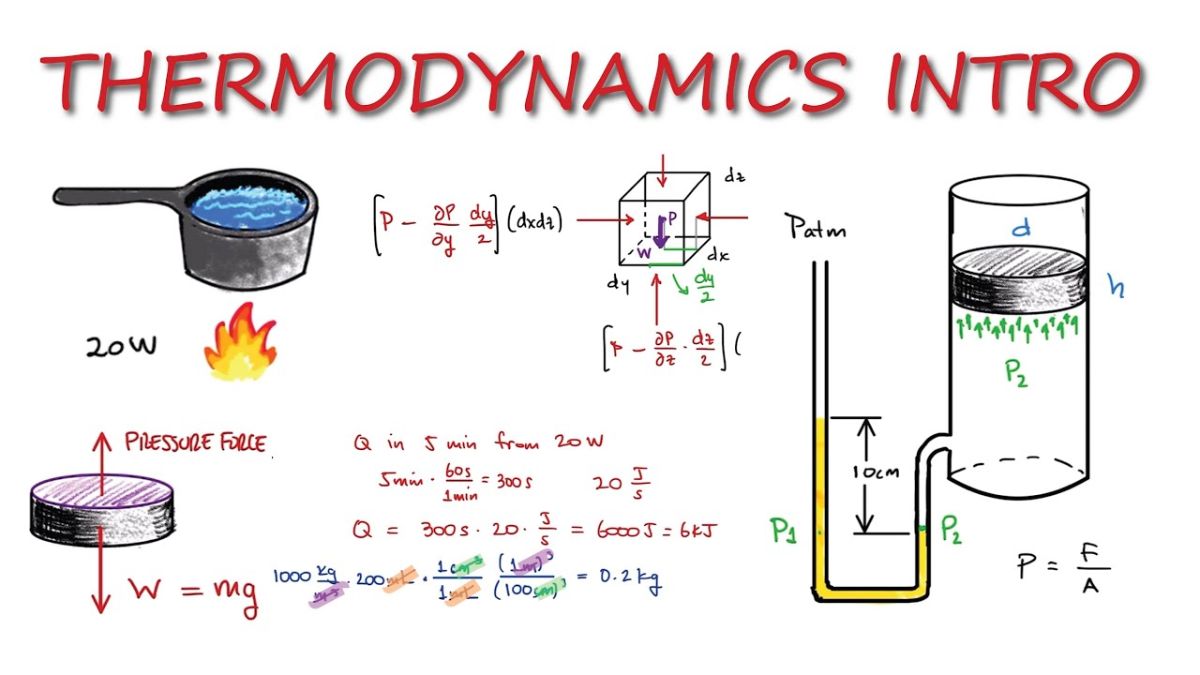The National Testing Agency will be conducting the NEET 2026 Exam in May 2026 as a process to short list and admit students for various medical courses like the MBBS and BDS. The process of preparation for the exam requires aspirants to study and understand all the important chapters and topics mentioned in the NEET Syllabus 2026. Physics is a very big part of the NEET Syllabus, and the Thermodynamics Chapter is an important part of the NEET Physics Syllabus 2026.
In the article below, we have added the NEET Physics MCQs for Thermodynamics Chapter so that all the aspirants studying this chapter can complete their preparations for the same by solving these MCQs.
NEET Physics MCQs for Thermodynamics Chapter
Thermodynamics is one of the most essential chapters in the NEET Physics syllabus, covering fundamental concepts crucial for understanding various phenomena in both classical and modern physics. The study of thermodynamics involves understanding heat, work, energy, and the laws that govern them. In NEET, questions from thermodynamics are often asked in multiple-choice format (MCQs) to test students’ comprehension, application, and problem-solving skills.
In this article, we have added the key concepts of the Thermodynamics chapter and provided a series of NEET-style MCQs along with detailed explanations. These questions are designed to help NEET aspirants prepare thoroughly and perform excellently in their exams.
Key Concepts of Thermodynamics
The Thermodynamics Chapter in the NEET Physics Syllabus covers how heat, energy, and work interact in both physical and chemical systems, focusing on the fundamental laws, energy conversions, and the application of concepts like enthalpy, entropy, and Gibbs free energy. Ahead, we have given an overview of the NEET Thermodynamics Chapter so that the aspirants can understand its basics:
1. Laws of Thermodynamics
- Zeroth Law of Thermodynamics: If two systems are each in thermal equilibrium with a third system, then they are in thermal equilibrium with each other.
- First Law of Thermodynamics: Energy cannot be created or destroyed, only transformed from one form to another. Mathematically,
, where
is the internal energy,
is the heat added, and
is the work done.
- Second Law of Thermodynamics: The total entropy of an isolated system always increases over time.
- Third Law of Thermodynamics: As temperature approaches absolute zero, the entropy of a system approaches a minimum constant value.
2. Heat and Work
- Work: In thermodynamics, work is done when a force causes a displacement. It can be positive or negative depending on whether the system is doing work or having work done on it.
- Heat: Heat refers to the energy transferred due to a temperature difference.
3. Internal Energy and Enthalpy
- Internal Energy (U): The total energy contained within a system due to both its microscopic motion and interaction between particles.
- Enthalpy (H): The total heat content of a system at constant pressure, defined as
, where
is the pressure and
is the volume.
4. Processes in Thermodynamics
- Isothermal Process: A process that occurs at constant temperature.
- Adiabatic Process: A process where no heat is exchanged with the surroundings.
- Isochoric Process: A process where the volume of the system remains constant.
- Isobaric Process: A process where the pressure of the system remains constant.
5. Entropy
- Entropy is a measure of disorder or randomness in a system. According to the second law of thermodynamics, the entropy of an isolated system tends to increase over time.
6. Heat Engines and Refrigerators
- Heat Engines: Devices that convert heat energy into mechanical work.
- Refrigerators: Devices that absorb heat from a cold reservoir and release it into a hot reservoir.
NEET Physics MCQs on Thermodynamics Chapter
Below, we have added some of the NEET Physics MCQs on Thermodynamics Chapter so that the aspirants can test their understanding and complete their preparations by solving them. Check the MCQs ahead:
Question 1: First Law of Thermodynamics
In an isothermal process, the change in the internal energy of the gas is:
a) Positive
b) Negative
c) Zero
d) Undefined
Correct Answer: c) Zero
Explanation: In an isothermal process, the temperature of the system remains constant. According to the first law of thermodynamics, the change in internal energy is related to the heat added and the work done. Since temperature is constant, the internal energy change
, hence the correct answer is zero.
Question 2: For an adiabatic expansion of an ideal gas, which of the following is true?
a)
,
b)
,
c)
,
d)
,
Correct Answer: b)
,
Explanation: In an adiabatic process, there is no heat exchange with the surroundings, meaning
. The work done by the system is equal to the change in internal energy, which is related to the pressure and volume change by
.
Question 3: What is the entropy change when an ideal gas undergoes an isothermal expansion?
a) Negative
b) Zero
c) Positive
d) Cannot be determined
Correct Answer: c) Positive
Explanation: During an isothermal expansion of an ideal gas, the system absorbs heat from the surroundings. As heat is transferred to the gas, its entropy increases, making the change in entropy positive.
Question 4: Which of the following statements is true according to the second law of thermodynamics?
a) The total energy of an isolated system is conserved.
b) Entropy of the universe remains constant.
c) Heat naturally flows from colder to hotter objects.
d) Entropy of the universe tends to increase.
Correct Answer: d) Entropy of the universe tends to increase.
Explanation: The second law of thermodynamics states that in any energy transfer or transformation, the total entropy of an isolated system will increase. This law explains why processes such as heat transfer naturally flow from hot to cold objects.
Question 5: The heat capacity at constant pressure is:
a)
b)
c)
d)
Correct Answer: a)
Explanation: Heat capacity at constant pressure, denoted as
, is the amount of heat required to raise the temperature of a system by one degree while keeping the pressure constant. It is given by the equation
, where
is the heat added and
is the change in temperature.
Question 6: In an isobaric process, the work done by the gas is:
a)
b)
c)
d)
Correct Answer: b)
Explanation: In an isobaric process, the pressure is constant, and the work done by the gas is given by the product of pressure and the change in volume, i.e.,
.
Question 7: The efficiency of a Carnot engine depends on:
a) Only the temperature of the hot reservoir
b) The temperature of the cold reservoir and the hot reservoir
c) The type of working substance
d) The work done by the engine
Correct Answer: b) The temperature of the cold reservoir and the hot reservoir
Explanation: The efficiency of a Carnot engine, a theoretical heat engine, is given by the formula
, where
is the temperature of the cold reservoir and
is the temperature of the hot reservoir. The efficiency depends on the temperature difference between these reservoirs.
Year Wise NEET Physics MCQs for Thermodynamics Chapter
In the table listed below, we have added the year wise NEET Physics MCQs for Thermodynamics Chapter so that all the students can start preparing accordingly. Click on the links below:
| Year Wise NEET Physics MCQs for Properties of Thermodynamics Chapter | |
| Year | Links |
| 2014 | Click Here |
| 2015 | Click Here |
| 2016 | Click Here |
| 2017 | Click Here |
| 2018 | Click Here |
| NEET Physics Chapters | MCQ Link |
|---|---|
| Physics and Measurement | Click Here |
| Kinematics | Click Here |
| Laws of Motion | Click Here |
| Work, Energy, and Power | Click Here |
| Rotational Motion | Click Here |
| Gravitation | Click Here |
| Properties of Solids and Liquids | Click Here |
| Thermodynamics | Click Here |
| Kinetic Theory of Gases | Click Here |
| Oscillation and Waves | Click Here |
| Electrostatics | Click Here |
| Current Electricity | Click Here |
| Magnetic Effects of Current and Magnetism | Click Here |
| Electromagnetic Induction and Alternating Currents | Click Here |










 NTA NEET 2026 Notification OUT at neet.n...
NTA NEET 2026 Notification OUT at neet.n...
 NEET Preparation Strategy 2026: Detailed...
NEET Preparation Strategy 2026: Detailed...
 Free NEET Sample Papers 2026 PDF | Downl...
Free NEET Sample Papers 2026 PDF | Downl...








